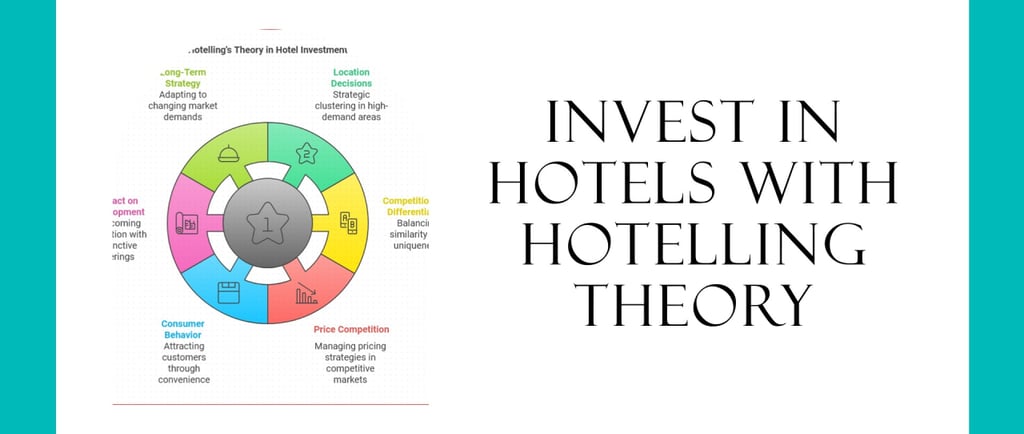Hotelling
Hotelling Theory for Hotel Investment
Mehdi Sayyou
10/23/20243 min temps de lecture


Hotelling's theory, also known as Hotelling's law or the principle of minimum differentiation, is an economic concept that helps explain why businesses often cluster together or adopt similar strategies to compete. Here's how Hotelling's theory impacts hotel investment.
Firstly, when it comes to location decisions, Hotelling's theory suggests that businesses in the same industry often choose to locate near each other. This clustering effect is especially evident in the hotel industry, where hotels are commonly found in popular tourist destinations, near transportation hubs like airports and train stations, business districts, or convention centers. For hotel investors, this means that rather than avoiding areas with many competing hotels, it can be beneficial to invest in properties near existing hotels or in established hospitality zones. This strategy takes advantage of agglomeration economies, where the presence of multiple hotels drives demand and customer awareness, making the area a prime location for travelers. According to Hotelling’s theory, when choosing between two hotels in the same price and quality range, consumers may prioritize location, encouraging hotels to cluster in the same regions to be accessible to the same pool of customers.
In terms of competition and differentiation, Hotelling’s theory suggests that businesses may converge toward offering similar products and services, leading to minimal differentiation. In the hotel industry, this can result in hotels in the same area offering comparable pricing and similar amenities, especially if they target the same market segments such as business travelers or tourists. This similarity in services can make it more difficult for individual hotels to stand out, creating intense competition within a specific geographical area. Therefore, hotel investors need to be aware of the potential risks of market saturation in highly concentrated areas. As hotels cluster together, pricing power diminishes, and investors may need to focus more on brand value or unique offerings to maintain a competitive edge.
Price competition is another significant aspect of Hotelling’s theory. Minimal differentiation can lead to price wars, which can negatively impact profitability. In clustered areas, hotels may engage in price competition to attract customers, leading to reduced profit margins. To counter this, investors in hotels located in competitive areas must implement sophisticated revenue management strategies, utilizing tools like dynamic pricing, promotional offers, and loyalty programs to maximize profitability while competing closely with other hotels.
Regarding consumer behavior and accessibility, Hotelling’s theory assumes that consumers prefer convenience and are likely to choose the option that requires the least effort. For hotels, this means that being located near transportation hubs, tourist attractions, or business districts is crucial to capturing the most demand. Guided by Hotelling’s principles, hotel investors tend to prioritize investments in prime locations where accessibility is key. This explains why certain areas, despite having numerous hotels, continue to see strong demand and command higher room rates.
Hotelling’s theory also impacts hotel development, leading to increased investment in prime locations. Investors may prioritize high-demand areas for hotel development, even if these areas are already saturated with hotels. This over-concentration increases competition but also benefits from shared demand. While clustering can drive demand, hotel investors must ensure their properties offer something distinctive, whether through unique design, innovative services, or a strong brand identity, to differentiate from competitors within the same area.
Finally, Hotelling’s theory influences long-term investment strategy. Over time, travelers’ preferences may change, and certain clusters may become less desirable. Hotel investors must be aware of these shifts in demand and be prepared to adjust their strategies, whether by investing in renovations, repositioning their property, or developing new amenities to stay competitive. Additionally, investors may seek to diversify their portfolios by investing in emerging areas that show potential for future clustering based on new developments such as upcoming infrastructure projects, business expansions, or rising tourism.
Nos Services
© 2025. All rights reserved.


